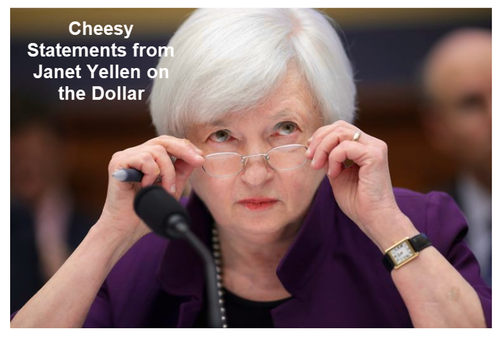Authored by Mike Shedlock via MishTalk.com,
Janet Yellen is Joe Biden’s Treasury Secretary nominee. She claims to support “market forces” as the driver for the US dollar. What does that really mean in a practical sense?
Swiss Cheese Statements on the US Dollar
Biden’s Treasury Secretary, Janet Yellen, is also a prior Fed Chair. I noted her Swiss Cheese Statements on the US Dollar.
“The United States doesn’t seek a weaker currency to gain competitive advantage. We should oppose attempts by other countries to do so.”
Yellen can make whatever swiss cheese statements she wants but how would a central bank act if it wanted to sink the dollar?
Steps to Weaken a Currency
- Cut interest rates
- Engage in massive QE balance sheet expansion
- Pledge to keep rates low indefinitely
- Pledge to ignore inflation and let it run hot to make up for alleged undershooting
- Encouraging more fiscal stimulus
The Jerome Powell Fed is five for five on doing the very things that would cause the dollar to sink and Yellen supports all of them.
Other counties are doing many of the same things and if they weren’t the dollar would be dropping faster.
Yellen is Yellin’ For More Free Stuff
Please note Yellen is Yellin’ For More Free Stuff
Ms. Yellen acknowledged the government’s mounting debt load, which stands at $21.6 trillion—or roughly 100% of a year’s economic output. But she urged lawmakers to put those concerns aside for now. Interest rates are at historic lows and expected to remain there for some time, making borrowing more affordable, she said.
Actually the National Debt is about $28 trillion, not $21.6 as claimed by Yellen.
They Are All Manipulators
I wonder how much collusion there is between these various currency manipulators and their tactics?
— Steve Alarm (@steve_alarm) January 21, 2021
The US, EU, Bank of Japan, China, and Swiss National Bank (SNB) are all major currency manipulators. They just use different tactics.
Q: Any Collusion?
No collusion because there can’t be.
The Swiss want the Franc lower than the Euro, the US wants a low dollar, the BOJ a low Yen, etc.
It’s global competitive currency debasement
That’s what keeps the dollar from a freefall as Yellen yaps about “market forces”.
What a hoot! https://t.co/6RRYPWuNc9
— Mike “Mish” Shedlock (@MishGEA) January 21, 2021
A: There Can’t Be
The Swiss want the Franc lower than the Euro, the US wants a low dollar, the BoJ a low Yen, etc.
It’s global competitive currency debasement . That’s what keeps the dollar from a freefall as Yellen yaps about “market forces”.
Competitive Currency Debasement 101
Competitive Currency Debasement 101:
The yuan doesn’t float so China can use a peg.
The BOJ, EU, SNB use negative rates and QE.
The SNB also defends a currency ceiling with unlimited buying.
The US uses QE and very loose fiscal policy.
Damn hard to make debasement headway! https://t.co/K4GPzVApTY
— Mike “Mish” Shedlock (@MishGEA) January 21, 2021
Manipulation Tactics Vary
- The yuan doesn’t float so China can use a peg.
- The Bank of Japan (BoJ), EU, and Swiss National Bank (SNB) use negative rates and QE.
- The SNB also defends the Franc from appreciation vs the Euro via a currency ceiling backed by unlimited buying.
- The BoJ also has in the past used currency ceilings and direct currency buying to maintain targets.
- The Fed uses QE and low but not negative rates coupled with its support for very loose fiscal policy. In contrast, the ECB has rules preventing extremely loose fiscal policy.
Direct vs Indirect Currency Manipulation
Tactics 1, 3, and 4 are direct currency manipulation. Tactics 2 and 5 are indirect currency manipulation.
The competing direct and indirect forces are what makes it very hard for countries to achieve consistent debasement headway!
I use the term “debasement headway” more than a bit sarcastically.
What About Hyperinflation?
The net result of the forces and counter-forces plus ongoing speculation determines currency trends.
To pick a country for high inflation, my bet is Japan first.
That’s based on demographics that will at some point change coupled with lingering impacts of Abenomics and negative interest rates of the BoJ.
Betting on US dollar hyperinflation in this setup is more than a bit foolish.
A Reader Asks: Why is the Euro So Strong?
For more discussion on the Euro vs the Dollar, please see A Reader Asks: Why is the Euro So Strong?
That link discusses an important fundamental flaw in the Euro known as Target2.
If the Eurozone breaks apart, then countries in the EU may see hyperinflation or severe inflation first.
Once again, betting on US dollar hyperinflation in this setup is more than a bit foolish.
Is the Fed Worried?
For comments by Danielle DiMartino Booth, a skilled Fed watcher, please see New All-Time Low Junk Bond Yield, Is the Fed Worried?
And What About Money Supply?
Finally, please consider Q&A With Lacy Hunt on Money Supply.
Tyler Durden
Sun, 01/24/2021 – 08:10
